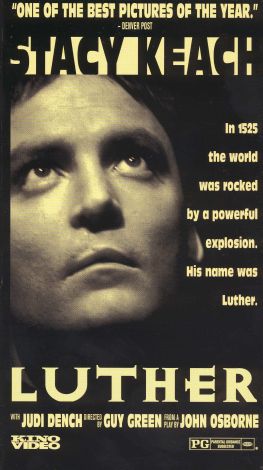Luther is a flawed but still very powerful adaptation of John Osborne's meditation on the 16th century religious leader whose condemnation of certain Catholic Church practices precipitated a revolution both religious and secular. The flaws are those common to many other entries in the American Film Theatre's productions -- mainly, it's an uneasy blend of cinema and stagecraft that falls between the two poles. It's not really satisfying as a straight-ahead filming of a stage play, nor does it satisfy as a cinematic adaptation. The stage-bound nature is perhaps more pronounced in Luther because it deals with a subject that had a profound effect upon the entire world; excluding that outside world from the film negates Luther's impact somewhat and makes him seem a bit smaller than the character warrants. If one can accept this flaw, however, Luther is a richly rewarding experience. Osborne's words have been diluted in a few cases by adapter Edward Anhalt, but they still maintain astonishing power. His portrait of Martin Luther is compelling yet disturbing, a finely detailed portrait that shows a man constantly in conflict with himself, with God, and with the actions he initiates in the name of faith. Stacy Keach's performance in the title role is nothing short of marvelous; he conveys the intense power of this darkly conflicted man yet doesn't resort to showboating. He underplays, he understates, and the character comes across as more powerful as a result. Yet he also lets the depths of his passions surface when necessary, to startling effect. Keach dominates the film, and the character he creates is overflowing with life -- and with bile. He is well supported by an excellent cast, with special mention for a superb Patrick Magee, an excellent Hugh Griffith, and an impressive Leonard Rossiter.

Luther (1974)
Directed by Guy Green
Genres - Drama |
Sub-Genres - Biopic [feature], Religious Drama |
Release Date - Jan 21, 1974 (USA - Unknown) |
Run Time - 112 min. |
Countries - United States |
MPAA Rating - PG
Share on